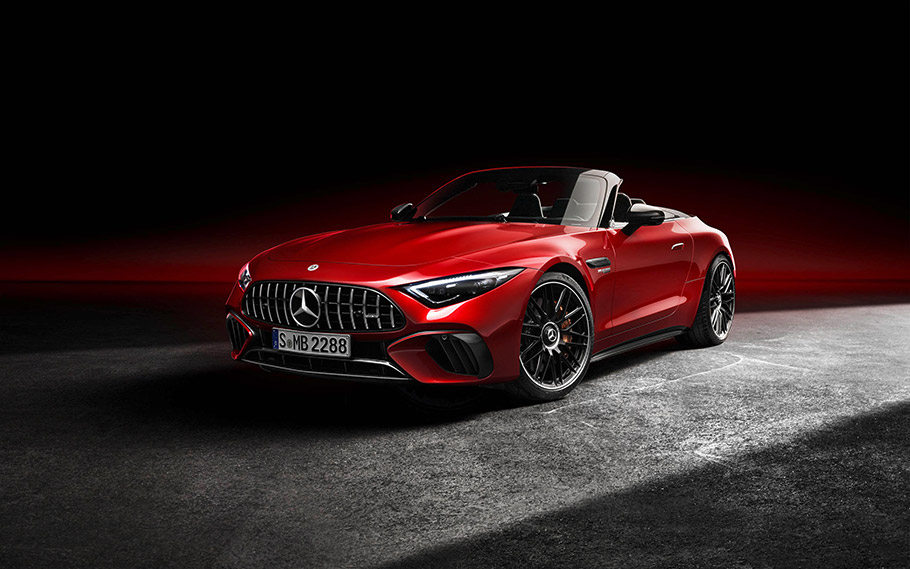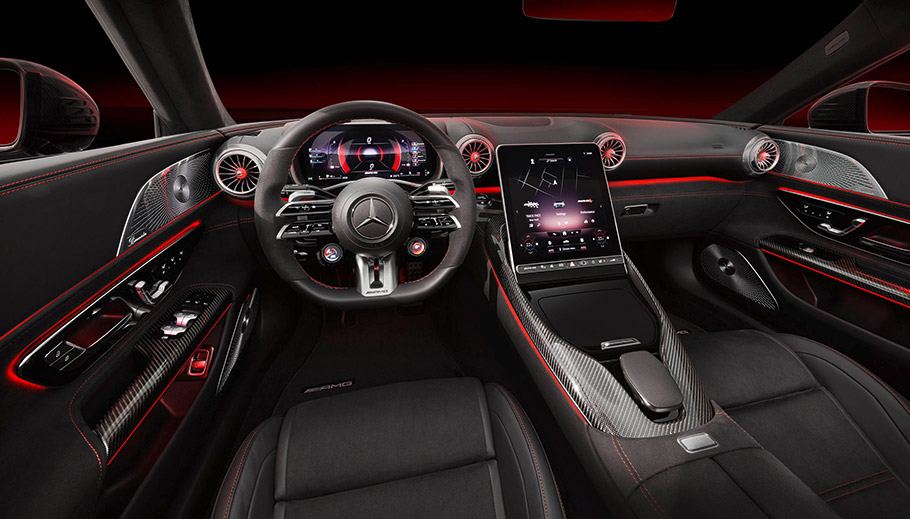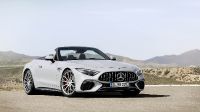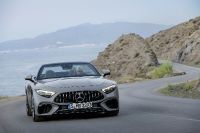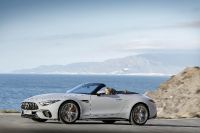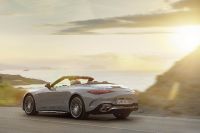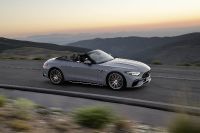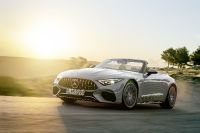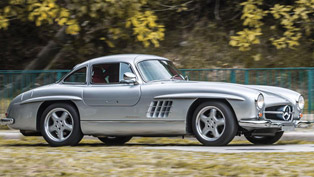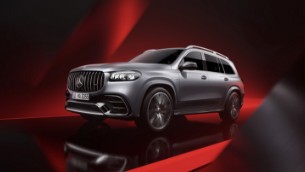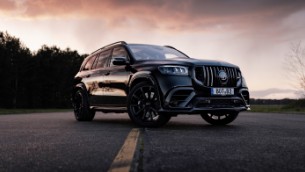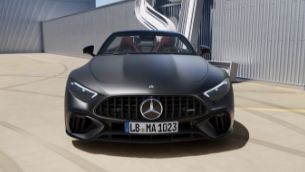2022 Mercedes-Benz AMG SL
The new Mercedes-AMG SL, the new edition of an icon, returns to its roots with a classic soft top and sporty character. At the same time, the luxurious roadster as a 2+2 seater is particularly suitable for everyday use and puts its power down on the road with all-wheel drive for the first time. High-tech components such as the AMG ACTIVE RIDE CONTROL suspension with active anti-roll stabilisation, rear-axle steering, the optionally available AMG ceramic high-performance composite brake system and the standard-fit DIGITAL LIGHT with projection function sharpen the sporty profile. In combination with the AMG 4.0-litre V8 biturbo engine, this results in a driving experience of the highest order. As a consistent Performance Luxury model, Mercedes-AMG in Affalterbach has developed the SL completely independently. Two models with AMG V8 engines will kick off the market launch.
Almost 70 years ago, a sports car launched in Stuttgart immediately became a legend. The vision of expanding the potential of the Mercedes-Benz brand through motor racing successes produced the first SL as a result - a road-going racing sports car. Shortly after its début in 1952, the 300 SL (internal designation W 194) reaped success after success on the race tracks of the world. In its first year, it achieved, among other things, a spectacular one-two victory in the legendary 24 Hours of Le Mans and even took the first four places in the Nürburgring Grand Jubilee Prize for sports cars. Its successes quickly make the SL a legend.
The successful racing car was followed in 1954 by the 300 SL production sports car (W 198), which is called the "Gullwing" because of its unusual doors. In 1999, a jury of motoring journalists voted it the "Sports Car of the Century". Other highlights of the model history include the "Pagoda" (W 113, 1963-1971), the evergreen R 107 (1971-1989), which was built for 18 years, and its successor, the R 129, which is considered an automotive sculpture because of its striking wedge shape. The abbreviation "SL" to this day thus stands for one of the few genuine automotive icons in the world.
In the decades-long development history from full-blooded racing car to open-top luxury sports car, the new Mercedes-AMG SL now sets another milestone. It combines the sportiness of the original SL with the unique luxury and technological excellence that characterise modern Mercedes models.
"The SL is an icon: For almost 70 years, the distinctive sports car has delighted Mercedes customers of every generation around the world. With the rebirth of the roadster from Mercedes-AMG, the new SL more than ever remains the symbol of this timeless fascination", says Britta Seeger, Member of the Board of Management of Daimler AG and Mercedes-Benz AG, responsible for Mercedes-Benz Cars Marketing and Sales.
"The new SL combines the sporty genes of the original SL with the driving performance typical of AMG. At the same time, it offers luxury and comfort at the absolute top level. This combination is unique in the sports car segment and is also reflected in the interior - where the highest levels of comfort and quality meet the right helping of sportiness. The high-quality combination of analogue world and state-of-the-art digital equipment makes it clear that the new SL is the rebirth of an icon for the modern era", says Philipp Schiemer, Chairman of the Board of Management of Mercedes-AMG GmbH.
"With the new SL, we have created a repositioning of the iconic SL design. The expressively modelled exterior conveys a light and purist impression and brings sensual beauty and extravagant design into perfect harmony", says Gorden Wagener, Chief Design Officer Daimler Group.
"We at Mercedes-AMG consider it a great honour to have had the privilege to develop the new edition of this sports car icon. When we were tasked with the overall development of the new SL, we were able to start from scratch without building on an existing structure. We are proud of the result, which once again demonstrates the high level of engineering expertise in Affalterbach. The new 2+2 concept combines agile driving dynamics with a high level of comfort and unrestricted suitability for everyday use", says Jochen Hermann, Chief Technical Officer of Mercedes-AMG GmbH.
With its exciting design, state-of-the-art technology and outstanding driving characteristics, the new Mercedes-AMG SL sets standards in the luxury sports car segment. The exterior design fascinates with a perfect triad: It combines the modern Mercedes-Benz design philosophy of sensual purity with the sportiness typical of AMG and characteristic details. The two power bulges on the bonnet are just one of numerous reminiscences of the first SL generation. The interplay of light and shadow makes the overall appearance visually light and low. So it is clear at first glance that the new SL has returned to its sporty roots.
Exterior design: balanced design with sporty genes
Characteristic features of the body design are the long wheelbase, the short overhangs, the long bonnet, the passenger compartment set back with a strongly raked windscreen and the powerful rear end. This results in the typical SL proportions. Together with the voluminously sculpted wheel arches and the large alloy wheels flush with the outer skin, they give the roadster its powerful, dynamic appearance. When closed, the seamlessly integrated soft top underscores the purist, sporty impression.
The AMG-specific radiator grille emphasises the effect of width of the front and, with its 14 vertical slats, cites the ancestor of all SL models, the legendary 300 SL racing sports car of 1952. Other distinctive design elements include the slim, sharply outlined DIGITAL LIGHT LED headlamps and the equally extremely slim LED rear lamps.
Interior design: Performance Luxury with "hyperanalogue" cockpit
The interior of the new Mercedes-AMG SL transforms the tradition of the first 300 SL Roadster into the modern era. The new edition perfectly combines sporting virtues and luxury. Fine materials and meticulous workmanship underline the standard of the highest level of comfort. The cockpit design, right down to the adjustable central display in the centre console, is focused on the driver. At the same time, the completely new interior space concept with 2+2 seats offers more room and functionality than before. The rear seats increase the daily practicality and offer space for people up to 1.50 metres tall.
The minimalist interior of the 300 SL Roadster, equipped with high-quality materials, inspired the designers in the interior design of the new model: The result is an exciting combination of analogue geometry and digital world - called "hyperanalogue". This is exemplified by the fully digital instrument cluster, which is integrated into a three-dimensional visor. The standard MBUX infotainment system offers a choice of several specific display styles and different modes.
One of many highlights in the interior of the new SL is the sculptural seat design of the standard, electrically adjustable AMG sports seats. The head restraints are integrated into the backrest and emphasise the sporty character. The AIRSCARF is on board as standard: Warm air flows into the passenger compartment from air outlets in the head restraints and wraps around the head and neck area of the driver and front passenger like a scarf. Perfect ergonomics and various progressive seam and quilting patterns complete the symbiosis of high-tech, performance and luxury. AMG Performance seats are available as an option.
The latest generation MBUX (Mercedes-Benz User Experience) is intuitive to operate and capable of learning. It offers numerous functional contents and the operating structure of the second-generation MBUX system, which debuted in the new Mercedes-Benz S-Class. In the SL, AMG-specific content is added extensively in five display styles. Exclusive menu items such as "AMG Performance" or "AMG TRACK PACE" also emphasise the sporty character.
Body shell: new roadster architecture with composite aluminium structure
The 2021 SL is based on a completely new 2+2-seater vehicle architecture developed by Mercedes-AMG. The chassis is designed as a lightweight composite aluminium structure and consists of an aluminium space frame with a self-supporting structure. The design guarantees maximum rigidity and is thus the perfect basis for precise driving dynamics, high comfort, optimal packaging and sporty body proportions. The new body shell was created - as with the first SL in 1952 - literally on a blank sheet of paper: Not a single component comes from the predecessor SL or any other model such as the AMG GT Roadster.
The aim of the body shell architecture is to realise the driving performance typical of AMG with a focus on lateral and longitudinal dynamics, while at the same time meeting the high standards on comfort and safety. In the new SL, the intelligent material mix enables the highest possible rigidity at a low weight. Optimised material cross-sections and sophisticated component shapes create space for the comprehensive comfort and safety features as well as the soft top. The materials used include aluminium, magnesium, fibre composites and steel, from which the windscreen frame, for example, is made. This serves as roll-over protection in conjunction with the roll bar system behind the rear seats, which can be extended at lightning speed when needed.
Compared to the previous model series, the torsional rigidity of the body shell structure increased by 18 percent. The transverse rigidity is 50 percent higher than the already outstanding value of the AMG GT Roadster. The longitudinal rigidity is 40 percent higher. The weight of the plain body shell is around 270 kilograms. Together with the low centre of gravity, the targeted lightweight construction ensures outstanding driving dynamics.
Active aerodynamics: for perfect balance and high efficiency
A key development focus of the new SL was high aerodynamic efficiency, specifically: a perfect balance between low drag and reduced lift. Here, the luxurious roadster benefits from Mercedes-AMG's wide-ranging motorsport expertise and from extensive active aerodynamic elements at the front and rear. All streamlining elements are seamlessly integrated into the exterior design. Further detailed measures reduce the drag coefficient to Cd 0.31 - an excellent figure for open-top sports cars.
The SL's aerodynamics meet the complex requirements of handling stability, drag, cooling and wind noise. Regardless of whether the top is down or up, the vehicle character and driving characteristics remain unchanged. The even aerobalance helps to defuse critical driving situations, such as a sudden evasive manoeuvre at high speed.
AIRPANEL air control system: two-piece for the first time
A technical highlight in the aero development: the two-piece, active air control system AIRPANEL. The first piece operates with vertical louvres hidden behind the lower air intake in the front apron. The second piece is located behind the upper air intake and has horizontal louvres. Normally all louvres are closed. This position reduces drag and allows the air to be directed specifically towards the underbody. This further reduces front lift. Only when certain temperatures on predefined components are reached and the demand for cooling air is particularly high do the louvres open (the second system only from 180 km/h) and allow maximum cooling air to flow to the heat exchangers.
Another active component is the retractable rear spoiler seamlessly integrated into the boot lid. It changes its position depending on the driving status. In doing so, the control software takes into account numerous parameters: It factors the driving speed, the longitudinal and lateral acceleration and the steering speed into the calculation. The spoiler assumes five different angular positions from 80 km/h to either optimise handling stability or reduce drag.
The optional active aerodynamic element, which is hidden in the underbody in front of the engine, also contributes to the improved handling. This carbon profile, which weighs around two kilograms, reacts to the setting of the AMG driving modes and automatically extends downwards by around 40 millimetres at a speed of 80 km/h. The AMG driving modes are then activated. This creates the so-called Venturi effect, which sucks the car additionally to the road surface and reduces front-axle lift. The driver feels this positively in the steering: The SL can be steered even more precisely into bends and tracks even more stably.
A range of aerodynamically optimised alloy wheels with diameters of 19, 20 or 21 inches is available for the SL, reducing drag through less turbulence. Particularly sophisticated are 20-inch wheels with plastic aero rings, which also save weight.
The soft top: less weight and low centre of gravity
The sportier positioning of the new SL also suggested the decision for an electric soft top instead of the previous metal vario roof. The 21-kilogram reduction in weight and the resulting lower centre of gravity have a positive effect on driving dynamics and handling. The space- and weight-saving Z-fold makes it possible to dispense with a conventional soft-top compartment cover. The front roof cap ensures that the open soft top is flush with the surface in its final position. At the same time, the developers were faced with the task of maintaining the high suitability for everyday use and the exemplary noise comfort. The three-layer design consists of a tightly stretched outer shell, precisely crafted roof liner and the acoustic mat made of high-quality 450 g/m² material inserted in between.
Opening and closing takes only about 15 seconds and is possible up to a speed of 60 km/h. The soft top is operated using the switch panel in the centre console or the multimedia touchscreen, on which an animation shows how the process is progressing.
Engine, transmission and all-wheel drive: great variety and more choice than ever before
At market launch, the new SL starts with two output levels of the AMG 4.0-litre V8 biturbo engine. The engines are assembled purely by hand at the company's site in Affalterbach according to the "One Man, One Engine" principle. In the top model SL 63 4MATIC+ (combined fuel consumption 12.7-11.8 l/100 km, combined CO2 emissions 288-268 g/km)[1] the engine develops 430 kW (585 hp) and provides a maximum torque of 800 Nm over a wide rev range from 2500 to 4500 rpm. Accelerating from 0 to 100 km/h takes only 3.6 seconds, the top speed is 315 km/h. In the SL 55 4MATIC+ (combined fuel consumption 12.7-11.8 l/100 km, combined CO2 emissions 288-268 g/km), the V8 unit develops an output of 350 kW (476 hp) and a peak torque of 700 Nm. The sprint from standstill to 100 km/h takes 3.9 seconds, the top speed is 295 km/h.
For use in the SL, the engine received a new oil pan, repositioned intercoolers and active crankcase ventilation. The intake and exhaust ducts have been optimised for even more effective gas exchange, and the exhaust gas routing for the catalytic converter box and petrol particulate filter has been enlarged. The developers achieved the increased output of the SL 63 4MATIC+ primarily through higher boost pressure and greater air flow, as well as modified engine software. To sum up, the eight-cylinder engine thrills with its exceptional power delivery and powerful acceleration in all engine speed ranges combined with maximum efficiency for low consumption and emission values.
Performance hybrid in development
At a later date, we will also offer the SL as a powerful Performance hybrid drive. The AMG E PERFORMANCE drive strategy is based on the guiding principle of offering an electrified powertrain that further enhances driving dynamics while also being highly efficient.
Wet start-up clutch for the transmission
The AMG SPEEDSHIFT MCT 9G transmission combines an emotionally appealing gearshift experience with extremely short shift times and is specially adapted to the requirements of the new SL. A wet start-off clutch replaces the torque converter. It reduces weight and, thanks to its lower inertia, optimises response to accelerator pedal commands, especially during spurts and load changes.
More traction and handling stability: fully variable AMG Performance 4MATIC+ all-wheel drive
For the first time in its almost 70-year history, the SL is available with a drive system acting on all four wheels. The two V8 models are equipped with AMG Performance 4MATIC+ all-wheel drive technology as standard. This intelligent system combines the advantages of different drive concepts: the fully variable torque distribution to the front and rear axles ensures optimal traction right up to the physical limit. The driver is also able to rely on high handling stability and a high level of safety under all conditions.
Suspension and brakes: Multi-link front axle, active anti-roll stabilisation and optimal deceleration
The SL 55 4MATIC+ is equipped as standard with a newly developed AMG RIDE CONTROL steel suspension with particularly capable aluminium shock absorbers and lightweight coil springs. For the first time, a series-production Mercedes-AMG vehicle is fitted with a multi-link front axle with five links arranged entirely within the rim. This significantly improves the kinematics. At the rear axle, a 5-link design likewise controls the wheels.
The innovative AMG ACTIVE RIDE CONTROL suspension with active, hydraulic anti-roll stabilisation makes its début in the SL 63 4MATIC+. Biggest innovation: Active hydraulic elements replace the conventional mechanical anti-roll bars and compensate for rolling movements of the new SL in fractions of a second. The system enables optimal steering and load-change behaviour with AMG-typical driving characteristics in terms of dynamics, precision and feedback for the driver. At the same time, it increases ride comfort when driving in a straight line and over bumps.
The newly developed AMG high-performance composite braking system guarantees excellent deceleration values and precise control. It impresses with short braking distances, sensitive response and high stability - even under extreme stress. The new composite brake discs are lighter than before and take up less space, which is used for even better brake cooling. The directional perforation is also new: In addition to the additional weight saving and better heat dissipation, this solution scores points with a faster response in wet conditions as well as better pad cleaning after braking manoeuvres.
Active rear-axle steering: combines agility and stability
For the first time in its long history, the SL is equipped with active rear-axle steering as standard. Depending on the speed, the rear wheels steer either in the opposite direction (up to 100 km/h) or in the same direction (faster than 100 km/h) as the front wheels. The system thus enables both agile and stable handling - characteristics that are in contrast to each other without rear-axle steering. Other advantages include easier vehicle control at the limits and less steering effort because the front-wheel steering ratio is more direct.
Six driving modes and AMG DYNAMICS: from comfortable to dynamic
The six AMG DYNAMIC SELECT driving modes "Slippery", "Comfort", "Sport", "Sport +", "Individual" and "RACE" (standard for SL 63 4MATIC+, included in the optional AMG DYNAMIC PLUS package for SL 55 4MATIC+) enable a wide spread of vehicle characteristics from comfortable to dynamic. The individual driving modes offer an individual driving experience, precisely tailored to different driving conditions. As a feature of the AMG DYNAMIC SELECT driving modes, the SL models also feature AMG DYNAMICS. This integrated vehicle dynamics control extends the stabilising functions of ESP® with agility-enhancing intervention in the all-wheel control, steering characteristics and additional ESP® functions. When cornering at speed, for example, brief braking intervention at the inner rear wheel generates a defined yawing motion around the vertical axis for responsive and precise entry into the bend. The spectrum ranges from extremely stable to highly dynamic.
SL range of equipment: great variety for an individual appearance
The equipment details and the numerous options offer a wide range of individualisation for the most diverse customer wishes - from sporty-dynamic to luxurious-elegant. Twelve paint colours including the two exclusive SL paints Hyper Blue metallic and MANUFAKTUR Monza Grey magno, three roof colour variants and numerous new wheel designs make the choice a pleasure. Three exterior design packages are available to further sharpen the look and make it either more elegant or more dynamic. The SL 55 4MATIC+ runs on 19-inch AMG multi-spoke alloy wheels as standard, optionally in silver or matt black. The SL 63 4MATIC+ sits on 20-inch AMG 5-twin-spoke alloy wheels. The range of wheels includes a total of nine different variants. They include two aerodynamically optimised 20-inch options in 5-twin-spoke or multi-spoke design. The range is rounded off with 21-inch AMG alloy wheels in a 10-spoke design and 21-inch AMG forged wheels in a 5-twin-spoke design, both in two colour variants.
Driving assistance systems and MBUX: intelligent helpers in the background
With the help of numerous sensors, cameras and radar, the driving assistance systems observe the traffic and the surroundings of the new roadster. If necessary, the intelligent helpers can intervene at lightning speed. As in the current generations of the Mercedes C-Class and S-Class, the driver is supported by numerous new or enhanced systems - in everyday situations, for example, by assistance for speed adaptation, distance control, steering and lane changes. When danger threatens, the assistance systems are able to respond to impending collisions as the situation demands. The functioning of the systems is visualised by a new display concept in the instrument cluster.
The new assistance display in the instrument cluster shows comprehensibly and transparently how the driving assistance systems work in a full-screen view. The driver can see their car, lanes, lane markings and other road users such as cars, trucks and two-wheelers in an abstracted 3D way there. The system status and operation of the assistants are visualised in this depiction of the surroundings. The new animated assistance display is based on a 3-D scene generated in real time. This dynamic, high-quality representation makes the operation of the driving assistance systems transparent as a tangible augmented reality experience.
